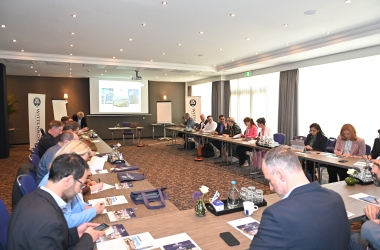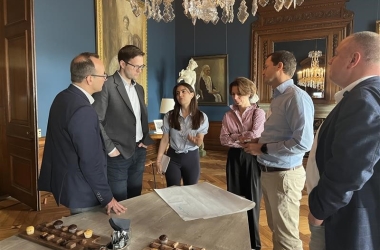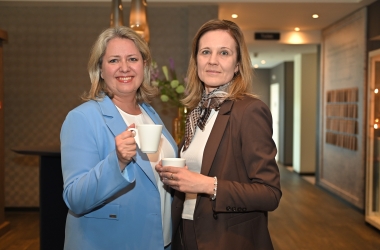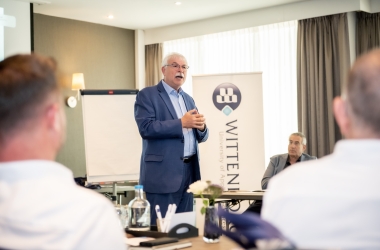Bridging Industry and Academia: Highlights from Wittenborg’s Round Table Event
Bridging Industry and Academia: Highlights from Wittenborg’s Round Table Event

Bridging Industry and Academia: Highlights from Wittenborg’s Round Table Event
Event Gathers Representatives from Various Institutions
To discuss key topics in the fields of applied research and business education, Wittenborg hosted the Round Table on Business Practice Education and Research on 14 and 15 May. The event was attended by nearly 40 people, including deans, vice-deans and professors of higher education institutions from 11 countries.
Held at Hotel De Keizerskroon in Apeldoorn, the first day of activities featured talks by Wittenborg President Peter Birdsall and Rector Ronald Tuninga. Hans Priem, Vice-President of Business Development at the VDL Group, also shared valuable insights on innovation management, sparking a dynamic discussion on industry-education collaboration across Europe and beyond.
According to Priem, cooperation between businesses and higher education institutions is essential to drive innovation. “Education, science and industry must work together to accelerate the process and ensure innovations reach the market as quickly as possible. At VDL Group, we collaborate with universities and applied research institutions worldwide to turn technological advancements into even better products for our customers,” he said.

The day concluded with an informal dinner, where participants continued exchanging ideas.
On 15 May, the discussions continued at Palace Het Loo, the former residence of Dutch royalty. Vice-Dean for International Relations Aranka Ignasiak-Szulc and Professor Malgorzata Jaworek from Nicolaus Copernicus University presented a case study on regional competitiveness and the vital role of universities in Poland.
Ignasiak-Szulc underlined that higher education institutions can produce research that informs policies and statements, positively impacting society at both national and international levels. “At Nicolaus Copernicus University, we conducted a project dedicated to foreign investment in our region. The results of that project helped formulate the policy and the instrument that will be implemented by our special economic zone to attract foreign investors,” she remarked.
Next, Wittenborg professor Ad Kil delved into the application of research within business practice, while Research Centre Manager Aydan Holtrigter spoke about faculty exchange programmes and the importance of international cooperation in research.

Holtrigter pointed out that higher education institutions must align with industry needs, equipping students with the skills and competences required by the labour market. She added that collaboration among institutions is essential for societal progress. “There are many shared challenges across countries, especially at the EU level, and by coming together we can exchange best practices and learn from one another. As a single institution, it’s very difficult to drive change, but by working together at both the regional and EU levels, we can make a greater impact.”
The programme also included a session led by Rector Ronald Tuninga, who offered insightful reflections on the future of research collaboration. The event concluded with an informal lunch at the palace’s restaurant.
Wittenborg CEO Maggie Feng stated that events like this help broaden participants’ horizons. “International collaboration is essential because businesses have no boundaries. By working together, we can learn from one another and improve ourselves, something that is crucial for institutions, students, lecturers, researchers and managers alike. It’s important to have a global vision, especially in today’s interconnected world.”

Dr Robert Buttery, Head of the International Relations Office at the University of Applied Sciences and Arts Northwestern Switzerland, was among the event’s participants. He praised Wittenborg’s initiative, highlighting that student mobility is essential for fostering cultural understanding and shaping an inclusive economic future — one that contributes to a fairer and more equitable world.
For Rector Ron Tuninga, the discussions also highlighted the imperative for business schools to act as agile, forward-looking institutions capable of responding to shifting global trends, including digital transformation, sustainability and workforce diversification. “The Round Table reinforced the shared understanding that business schools must continue to build and strengthen international networks. Through deeper collaboration and sustained engagement with industry partners, they can ensure their graduates are well-prepared for the future of work and that business schools remain key drivers of innovation, societal value and global economic development,” he concluded.
WUP 23/05/2025
by Ulisses Sawczuk
©WUAS Press
675 words